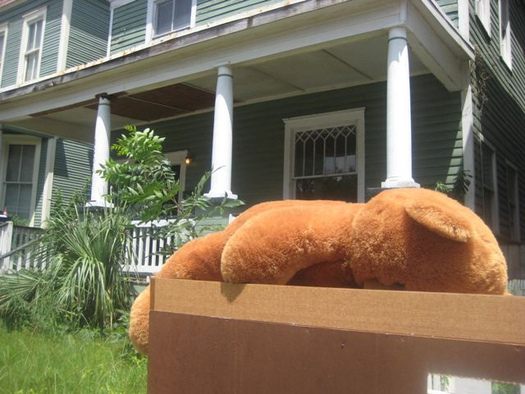Basically it’s an add-on for Flickr users, and all it does, when you sign up, is send you, twice a month, pictures that you took and upladed one year earlier. (Apparently with some effort it can be used in conjunction with other places where individuals might store digital pictures, including your hard drive. I've only used it with my venerable Flickr account.)
Is it interesting to look at pictures I took a year ago? It turns out the answer is yes. It’s not profound; it doesn’t make me want to run to my window and shout revolutionary slogans about Digital Power To The People. But it’s pleasurable. And – again, quietly – provocative.
I don’t know if Time Capsule was difficult to create, but it’s disappearingly simple to use, and conceptually so basic as to be almost forgettable. I have a feeling that this modestly is part of the charm, because it syncs up so well with a mission that is subtly subversive. In its not-noisy way, Time Capsule pushes back against a problematic side-effect of digital culture.
As noted, I don’t remember when or why I signed up, but I think it’s no coincidence that my appreciation of Time Capsule kicked in right around the time I started using Instagram. I only follow a half-dozen people or so at this point; their pictures are all perfectly fine, and I don't have any plans to quit, etc. But when I scroll through what’s on offer it stretches from images made an hour ago all the way to ... images made two days ago. That's by design, because like most “creative expression” tools aimed mass audiences, Instagram’s mission is to prod You The User to produce more, now … and now … and now. As an expert source type in a recent New York Times article about Instagram put it, the service arrived just as a critical mass of mobile-phone owners were working photography “into their regular broadcasting routine.” (I can’t immediately think of a more depressing phrase.) The point is that Instagram, for better and worse, is in line with all the other tools designed to enable, and provoke, expression in the moment, all the time: Take a picture, push it through whatever online channels you wish. And then move on.
It’s the “and then move on” that bugs me. Time Capsule, in contrast, is not a “broadcast now” tool, it’s a personal “oh yeah” tool. “Oh yeah,” I say to myself, looking at a snap (below) I took of the house two doors down, the day that the residents moved out, victims of the foreclosure crisis. “Oh yeah,” I say again, encountering an image of the early days of our neighborhood community garden, when it still looked more like the vacant lot it used to be. “Oh yeah,” I repeat, considering a picture of a vine growing over a doorway, taken for no specific reason, on a routine walk, one year ago.

"Foreclosed," snapped two doors down, one year ago. ("Oh yeah... ")
I think there’s more value, or maybe more power, than is obvious in a simple “Oh yeah.” I’ve never been a fan of the idea, popular in some techno-futurist circles, that we’ll eventually just outsource memory itself to “the cloud,” accessing the data we need, on demand. What about the memories that we don’t happen to be demanding, that we don’t remember enough to know to demand? Flipping through an old photo album isn’t an “on demand” experience – it's enjoyable precisely because you find what is there, whether it’s what you’re looking for or not. Sometimes it sparks fond memories. Sometimes it makes you feel old. Sometimes it surprises you with evidence of some thing balanced just on the lip of forgotten.
Possibly the desired aim of Time Capsule is for me to wrap this up by declaring: “It inspires me to take more pictures!” And it may have just that effect on other users. But the effect this simple little tool has on me is different, and (for me) more valuable. There could be a whole category of services here, actually. What would it feel like to be reminded of status updates from a year ago? Blog posts from two years ago? YouTube “likes” and “favorites” from three years ago? Blog comments from four years ago? Expression left behind, on some service you don’t use any more and forgot you ever had, five years ago? What effect would it have to be reminded, more often, that there was a time that existed, before now — and one that comes after, too?(Final note: Don't misread the above as a dismissal, or even a critique, of Instagram or digital/phone snapshots in general. I may have more explicit things to say on those subjects later; this post is the first in what I imagine will be an intermittent series touching on digital-age photography and related matters.)
